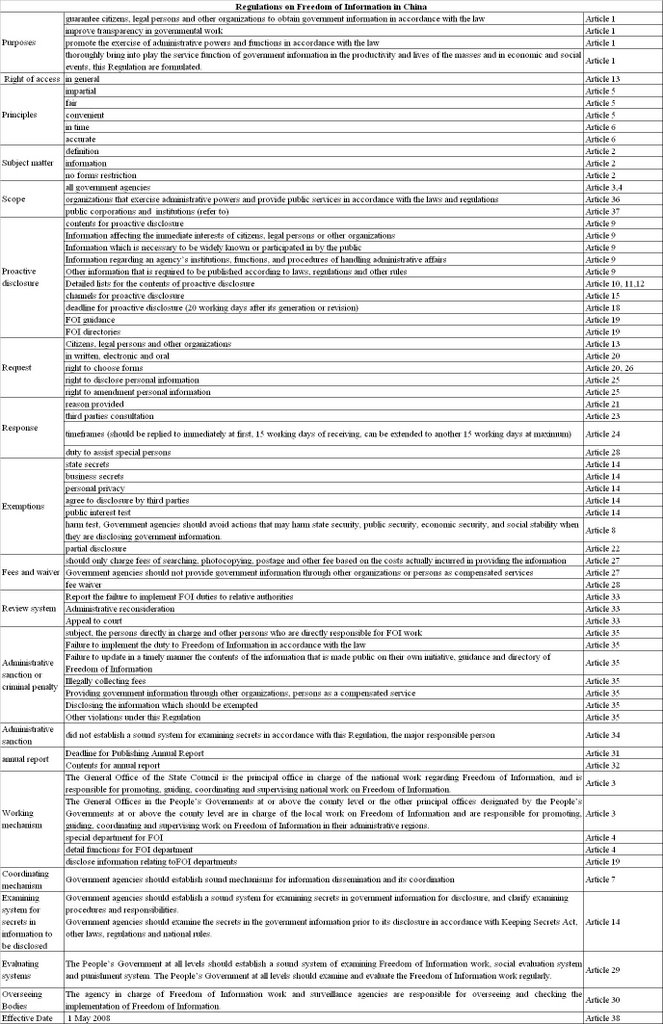Freedom of Information Reform in China: Information Flow Analysis
28 September is the right to know day. I share my thesis abstract with all of you. Any comments are welcomed. Cheers.
Thesis Title: Freedom of Information Reform in China: Information Flow Analysis
Abstract:
Most non-Chinese scholars have approached Freedom of Information (FOI) in China as a recent, strange and intriguing phenomenon. This thesis uses an array of Chinese sources, interviews with Chinese officials and citizens and information flow analysis to propose a more complex and detailed understanding of the evolution of FOI in China.
The thesis argues that information flow, a theme to explore the gradual development of government receptivity to FOI in an information environment through time, can be used as a new explanatory model for FOI reform in a jurisdiction. China serves as an example to substantiate this argument. The origins of China’s FOI legislation need to be understood within the context of improved information flow resulting from changed social, political, legal and economic conditions. This improved information flow has constituted an enabling environment for the adoption of FOI legislation.
This thesis also argues that it is necessary to reassess the widely divergent origins of FOI reform in China. By applying information flow analysis, the thesis asserts that social, political and legal factors should be accorded central roles in understanding the development of FOI in China. Economic growth and anti-corruption efforts in the process should be allocated important but secondary roles.
This thesis uses information flow analysis to find that FOI reform in China formed part of a much longer process of increased transparency in the Chinese information environment, which gradually shifted from the acceptance of proactive disclosure to that of reactive disclosure. FOI thus has become a beneficiary of this gradual transformation of the Chinese information environment. This is the reason that China has adopted a push model of FOI legislation stressing proactive disclosure of government information, which differs from many countries that have introduced a pull version of FOI legislation emphasising reactive disclosure through responses to access requests.
The thesis maintains that existing compliance analysis focuses too heavily on reactive disclosure, and thus is restricted in its application to China. It therefore utilises a revised compliance analysis model that focuses on both proactive and reactive disclosure. The revised model incorporates findings from empirical research conducted in China, allowing a more effective and dynamic analysis of compliance issues in China. Whilst information flow analysis in this thesis is limited in its application to an explanation of China’s FOI phenomenon, it may have wider applicability. This analysis is a dynamic and systematic explanatory framework for FOI.
The thesis argues that information flow, a theme to explore the gradual development of government receptivity to FOI in an information environment through time, can be used as a new explanatory model for FOI reform in a jurisdiction. China serves as an example to substantiate this argument. The origins of China’s FOI legislation need to be understood within the context of improved information flow resulting from changed social, political, legal and economic conditions. This improved information flow has constituted an enabling environment for the adoption of FOI legislation.
This thesis also argues that it is necessary to reassess the widely divergent origins of FOI reform in China. By applying information flow analysis, the thesis asserts that social, political and legal factors should be accorded central roles in understanding the development of FOI in China. Economic growth and anti-corruption efforts in the process should be allocated important but secondary roles.
This thesis uses information flow analysis to find that FOI reform in China formed part of a much longer process of increased transparency in the Chinese information environment, which gradually shifted from the acceptance of proactive disclosure to that of reactive disclosure. FOI thus has become a beneficiary of this gradual transformation of the Chinese information environment. This is the reason that China has adopted a push model of FOI legislation stressing proactive disclosure of government information, which differs from many countries that have introduced a pull version of FOI legislation emphasising reactive disclosure through responses to access requests.
The thesis maintains that existing compliance analysis focuses too heavily on reactive disclosure, and thus is restricted in its application to China. It therefore utilises a revised compliance analysis model that focuses on both proactive and reactive disclosure. The revised model incorporates findings from empirical research conducted in China, allowing a more effective and dynamic analysis of compliance issues in China. Whilst information flow analysis in this thesis is limited in its application to an explanation of China’s FOI phenomenon, it may have wider applicability. This analysis is a dynamic and systematic explanatory framework for FOI.

1 comment:
Dear Weibing Xiao, I have only now come across the abstract of your thesis. I already find that abstract very rich. Especially I do share your view that passive and active transparency need a holistic approach (and not only in China). Also I am very much intrigued about your methodology and would like to learn more about it. Has your thesis been published already and where is it obtainable (my Chinese teacher could help me to go through it.) Do you still work on such issues?
Best regards, Herbert Burkert
Post a Comment